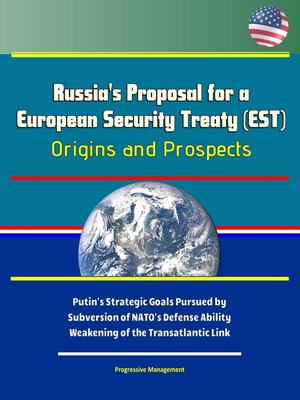Russia's Proposal for a European Security Treaty (EST)
ebook ∣ Origins and Prospects--Putin's Strategic Goals Pursued by Subversion of NATO's Defense Ability, Weakening of the Transatlantic Link

Sign up to save your library
With an OverDrive account, you can save your favorite libraries for at-a-glance information about availability. Find out more about OverDrive accounts.
Find this title in Libby, the library reading app by OverDrive.



Search for a digital library with this title
Title found at these libraries:
| Library Name | Distance |
|---|---|
| Loading... |
This report has been professionally converted for accurate flowing-text e-book format reproduction. In 2008-2009, Dmitry Medvedev, then the President of Russia, proposed the conclusion of a European Security Treaty (EST) to provide "indivisible security" for nations from Vancouver to Vladivostok. Although this proposal came during a "reset" of Western relations with Russia, NATO governments ultimately rejected it. This study analyzes the treaty proposal and assesses Russian motivations for suggesting it. The study also explains why NATO governments rejected the EST, a proposal with provisions contrary to Western security interests. The potential for improved security cooperation between Russia and the West has been significantly limited since Vladimir Putin's return to the presidency in 2012. Russia has annexed Crimea, destabilized eastern Ukraine, and taken other steps intended to discredit, fragment, and undermine the Western-led liberal world order. This study considers Western and Russian viewpoints, notably in light of developments since Medvedev proposed an EST. Although Russia has violated key elements of its proposed treaty, the Kremlin has nonetheless pursued the strategic goals it had hoped to achieve through the EST: subversion of NATO's cohesion and collective defense ability, weakening of the transatlantic link, veto power for Moscow in the European security architecture, and dominion in Russia's near abroad.
This compilation includes a reproduction of the 2019 Worldwide Threat Assessment of the U.S. Intelligence Community.
This study is based on a qualitative historical study and analysis. It benefits from research work done by experts in this field. The primary documents include not only the unofficial English translation of the EST proposed by President Dmitri Medvedev, but also official as well as unofficial statements made by his successor, President Vladimir Putin, and the Russian Foreign Minister, Sergei Lavrov. Additional sources include works of scholarship, published interviews, news articles, and similar basic documents. This study provides an analysis of Russia's EST proposal. Chapter II discusses Russia's proposed EST, examines its implications, and considers arguments for and against the proposal. Chapter III presents the Russian arguments for the EST and discusses significant events and changes in Russian foreign policy since the proposal was first made in 2008-2009. Chapter IV considers the positions of France, Germany, and the United Kingdom in response to the proposal, discusses the pertinent reasons for their rejection of the EST proposal, and reviews significant events since the proposal which shaped their current policies. Chapter V presents conclusions regarding Russia's continuing efforts to undermine NATO and the European Union and to enhance the Kremlin's overall power position.







